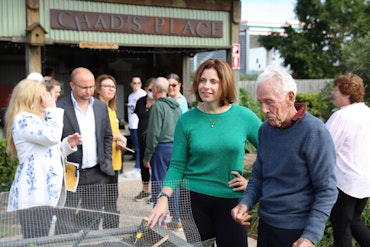Australian researchers hope to answer the age-related trillion-dollar question
Hearing loss is considered a vital priority in addressing global rates of dementia.
![<p>Dr Dona Jakody and Peter Millington [pictured] are leading the charge for innovative ear science. [Source: Ear Science Australia]</p>](https://agedcareguide-assets.imgix.net/news/articles/wp/Hearcog__1302.jpg?fm=pjpg&format=auto&w=550&q=65)
Dr Dona Jakody and Peter Millington [pictured] are leading the charge for innovative ear science. [Source: Ear Science Australia]
Key points:
- The global cost of unaddressed hearing loss is $1 trillion US dollars annually
- Over five percent of the world’s population — or 430 million people — require rehabilitation to address their disabling hearing loss, including 34 million children
- It is estimated that by 2050 over 700 million people — or one in every 10 people – will have disabling hearing loss
Ear Science Institute Australia has teamed up with the Western Australian Centre for Health and Ageing and the University of Western Australia to work on HearCog — a ground-breaking, two-year randomised control trial of hearing loss and dementia.
HearCog is a clinical trial investigating whether the correction of hearing loss using hearing aids could decrease the 12-month rate of cognitive decline among older adults at risk of dementia. 180 older adults with hearing loss and mild cognitive impairment were recruited to undertake the study.
Although there are no definitive studies that prove treatment for hearing loss will impact cognition, the Lancet Commission for Dementia listed hearing loss as a priority for tackling dementia in a landmark report.
Dr Dona Jayakody, audiologist and research lead for the Cognition and Hearing Loss Project at Ear Science, developed the trial concept for HearCog in 2015 when she began researching the link between cognition and hearing loss.
“My research found that hearing loss is associated with cognitive impairment/dementia, so I was interested in finding out whether this could be delayed or arrested by treating hearing loss,” she said.
“Current data suggests hearing loss accounts for eight percent of the modifiable risk factors of all cases of dementia.
In Australia, results from a hearing test had previously revealed that, at the time of testing in 2018 – ‘19, more than four in 10 — or 43 percent of — Aboriginal and Torres Strait Islander people, seven years or older, had hearing loss in one or both ears.
Other innovations in ear health and science have prompted research on how many people are willing to seek out treatment for hearing loss. Research commissioned by Starkey found that 83 percent of Australians 50 years and older were ‘very comfortable’ using glasses for poor eyesight, but were hesitant to adopt hearing aids for sensory difficulties.
Although the results of HearCog trials are yet to be finalised, several important issues have emerged during the recruitment phase and as the study commenced. Participants reported the significant impact that their hearing loss has on loneliness, social isolation, communication challenges and quality of life. Several reported suicidal ideations at the thought of developing dementia.
Co-lead of the study, Associate Professor Andrew Ford said the team of researchers came across unforeseen reports from participants.
“Many things have emerged from this study that we didn’t expect, such as participants wanting to improve their hearing health but having no one to go home to hear with or learn from,” he said.
Study participants completed comprehensive assessments of their hearing, cognitive skills, mental/physical health and lifestyle. They were all expertly fitted with hearing aids, with some participants waiting a year to receive theirs, as part of the randomised intervention design of the study.
Scientists used brain imaging techniques to examine the impact of well-being, in addition to testing whether it was a cost-effective solution — all participants in the HearCog study were selected based on their risk of dementia.
Ear Science Chief Executive Officer and Adjunct Associate Professor Sandra Bellekom commented on the study, which started in 2021 and was delayed by the pandemic, with preliminary findings set to be published in mid-2024.
“Hearing loss is such a concern for humanity and there is no cure or effective treatment currently in sight for dementia,” she said.
“Ear Science has taken a calculated risk on this study to try and identify factors that help prevent or delay both age-related and pathological cognitive decline and dementia.
“We anticipate that our final findings will have significant implications on clinical practice and health policy development worldwide.”
Do you suffer from hearing loss? Check out the guide to protecting your hearing and managing ear damage.
Let the team at Talking Aged Care know your thoughts and subscribe to the newsletter for more insight, information and industry updates.
Related content:
Latest technology to assist and entertain during retirement























Comments